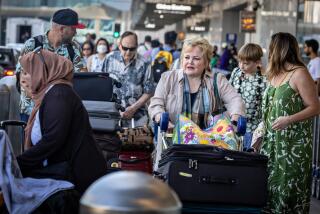A Breach That Can Teach
- Share via
As any air traveler knows, the 48,000 screeners employed by the $5-billion-a-year Transportation Security Administration since 9/11 are proficient at confiscating small objects like pins and nail scissors. But not always, it seems, at detecting the very weapons that were used on Sept. 11, 2001 -- box cutters. The real question, however, is how much that matters.
The case of Nathaniel Heatwole, a 20-year-old college student who warned the TSA by e-mail that he had planted plastic bags containing box cutters, bleach and other banned items on Southwest Airlines planes, has Congress in an uproar.
The House Government Reform Committee, headed by Rep. Thomas M. Davis (R-Va.), is planning to investigate, and Sen. John McCain (R-Ariz.), chairman of the Senate Commerce Committee, intends to hold hearings.
So effective was Heatwole in planting items on two planes that Rep. Edward J. Markey (D-Mass.) declared Tuesday that he should be sentenced to work 20 hours a week for the TSA, which should be sentenced to listen to him.
All the outrage on Capitol Hill omits the fact that air security wasn’t radically threatened by Heatwole. With about 2 million passengers a day, a certain number of slips are inevitable. Unlike Israel, a small country with a limited number of flights, the U.S. will never be able to devote sufficient resources and manpower to reach a state of almost perfect air security. But cockpit doors have been strengthened and passengers have helped crews subdue a number of lesser threats since Sept. 11, 2001. If worse comes to worst, the Air Force is prepared to shoot down hijacked airplanes.
The TSA receives about 5,700 e-mails a day. If it makes every conceivably threatening e-mail a priority, the word “priority” will have little meaning. If it hands every possible threat to the FBI, the bureau will start ignoring them.
Better judgment, not a panic reaction, is what’s called for. Certainly Heatwole has given the TSA a black eye. The objects he hid lay undiscovered in the restrooms of Southwest planes for weeks.
Nor were the box cutters a lone lapse. Investigators from the Department of Homeland Security recently smuggled a gun, a bomb and knives through boarding security at Boston’s Logan International Airport. Senators, including Charles E. Schumer (D-N.Y.), have made public the ridiculous laxity of tests for hiring luggage screeners. Much of the commercial cargo that is carried on passenger jets never is checked for hazardous materials.
Instead of taking a Chicken Little approach, however, lawmakers should recognize that air security is far better than before Sept. 11. The next step is to call for regular evaluations of which forms of security are most effective, to improve crew training and to remind passengers to remain alert.
As showman-like as Heatwole’s acts were, better to learn from them than to use them as a club.
More to Read
Sign up for The Wild
We’ll help you find the best places to hike, bike and run, as well as the perfect silent spots for meditation and yoga.
You may occasionally receive promotional content from the Los Angeles Times.






